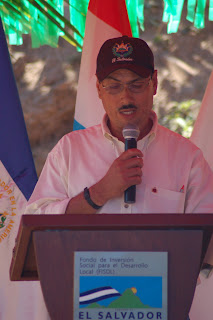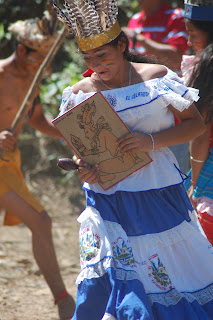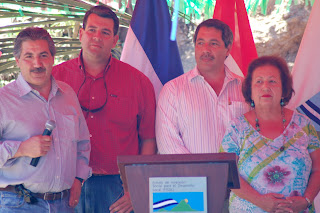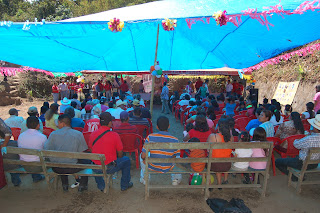Thursday, 2-17-11
Today was a very special day. We had a celebration in the caserío of Alejandría to celebrate the recent installation of electricity and running water for each home. It was a very important event that many people in the community attended as well as people who helped fund and move the project to completion. The event was supposed to start at 10am but this is El Salvador so time is flexible. This is a good thing because the pupusas that were supposed to be delivered to the house at 9:30 didn’t get here till 10am.
We arrived fashionably on time-ish at 10:20. Lots of people were there but many were still to arrive. It was hotter than blazes out today so I was very grateful for the two tents that were put up yesterday. Otherwise I would have turned into a crispy critter. The event kicked off at 10:30am with noisemakers being set off. They are called cohetes and are basically fireworks without the lights. That and you hold them in your hand while you light the fuse with a smoldering piece of wood. Apart from that they’re pretty much the same thing.
The event began by someone from city hall talking about the various people and organizations that helped make these projects possible. That includes the city hall of Berlín, FISDL, the Directiva of Alejandría, the country of Luxembourg, the Pastoral House, Intervida, Provida, and the Handal family of El Salvador. A little bit about the organizations:
FISDL- Social Investment Fund for Local Development. In the FISDL we are committed to continuously improving our processes to reduce poverty and promote local development in the context of governmental social policy. For that reason, we made management resources and we have a team of competent, motivated, and committed principles and institutional objectives.
Intervida- Our overall objective is to contribute so that the most vulnerable populations have the opportunity to lead a dignified life, by guaranteeing their life sustenance, reinforcing their self-respect and promoting liberty so that they can realize themselves as individuals and as a community. Intervida prioritizes actions aimed at the development of basic social rights; as such, our cooperation for development projects focus on two main sectors: education and health.
Provida- Group whose work is in the area of assisting and educating pregnant women, early childhood nutrition education, increasing the nutrient levels of foods via education and training using a variety and healthier food preparation techniques.
Directiva of Alejandría- The Directiva of a community is like a community board. They have a president, vice president, treasurer, secretary, legal person, and other positions. They work with organizations, often non-governmental organizations (NGOs), on specific projects for their community. It is a legal organization that pays dues and has regular meetings. When churches from Iowa visit their sister communities in El Salvador they almost always meet with the Directiva of the community.
Pastoral House- Their responsibilities include organization and education for community leadership, project facilitation between the church partnerships and the communities, financial management for projects, and other basic requests for health, education, food, and clothing that come to the Pastoral House every day. This is the place where I am staying right now and where church delegations stay when they visit. The people here do a TON of work all on a volunteer basis.
Handal Family- This family donated a portion of land to the caserío of Alejandría for the water project. On the land they donated is where the water tanks that collect the water are located and the tanks plus a system of tubes are used to provide each family with running water. The mother and her four sons gave the land in memory of her late husband. The father’s father was originally from Turkey which is why their last name is not Latino. Land ownership is very important in El Salvador and oftentimes people do not own the land they live or work on. Even if they do own land they must be able to produce a deed for the land if they want to build on it.
Luxembourg- The country of Luxembourg donated a significant amount of funds to this caserío to help pay for the water and electricity projects.
After the introduction of the organizations and people the national anthem of El Salvador was played which is “Saludemos la Patria Orgullosos” (We Proudly Salute the Fatherland) created in 1879. Next was the national anthem of Luxembourg which is “Ons Heemecht” (Our Homeland) adopted in 1895. We stood for both songs as they were played.
The welcome was done by Balmore, who is a member of the Pastoral Team and the president of the Directiva in Alejandría. He is probably one of the most eloquent speakers I have ever heard. He speaks with such force and passion but in a very soothing voice. Today he seemed more nervous than I’ve ever seen him before. That alone told me that this event was a very big deal and that people really wanted to make a good impression on all the important people that were attending. One especially important point he made was that the electricity and running water meant a brighter future for the children of Alejandría. He thanked everyone for coming: the organizations for their support and assistance, the Handal family for the donation of land, the people of the community for working together toward a goal, Luxembourg for financial assistance, God for making these projects happen, and, of course, Oscar Romero for being an inspiration.
Food for the celebration
The tents
Where the celebration was held
Many people had already arrived
FMLN flag
FISDL banner
Shield of Berlin banner
Setting off cohetes
They are really loud
Up in smoke
Father Santos
Representative from Luxembourg
Reoresentatives of organizations, the Directiva,
the Pastoral House, and the Handal family
City Hall people speaking
Balmore, president of the Directiva of Alejandria
and member of the Pastoral Team
Jesus, member of the Pastoral Team
who lives in Alejandria
Some people from FISDL and city hall spoke next about the projects but after a while the crowd stopped paying attention because we were distracted by some people we saw on the road above dressed in costumes. Betty, Maurice, and I knew what was going on because Kathy had just told us. There was going to be a dance with music performed by the youth El Recreo dressed in indigenous clothing.
This performance was very exciting not only for us but for everyone in the community. There are very few indigenous people left in El Salvador because much of the culture has been wiped out. The Lenca, Mayan, and Pipil were the three dominant indigenous groups that occupied El Salvador during various times throughout history. In 1524 the country was conquered by the Spanish adventurer Pedro de Alvarado and made into a Spanish colony with resistance being crushed by 1540. Alvarado destroyed much of the native culture. By 1600 there were fewer than half indigenous people remaining in El Salvador.
Then in 1932 there was a peasant uprising led by Augustín Farabundo Martí (for whom the FMLN is named) which was suppressed by the military at a cost 30,000 lives, virtually eliminating indigenous people. In Western El Salvador hundreds of peasants had risen up against the new government which was tainted by corruption, but this resistance was crushed by the Army. The leader of the Army, Maximiliano Hernández Martínez, started a genocide against his own population. Since most of the people that participated in the uprising were of indigenous origin anyone that looked or dressed like a native or spoke Nahuatl was killed by the army. This massacre is called “La Matanza” which means “The Slaughter.”
To avoid further violence, members of the indigenous groups generally severed their ties to their culture, adopting Western dress and the Spanish language as well as intermarrying with members of non-indigenous groups. In modern-day El Salvador, it is estimated that 1% or less of the population is of exclusively indigenous descent. Thus, unlike neighboring Guatemala, virtually no one in El Salvador speaks an indigenous language, wears the clothing of their ancestors, or performs the traditions of the indigenous people who once inhabited this country. The people of El Salvador are struggling to bring back the culture and traditions of their ancestors. This is why the performance was so interesting not only to us gringos but also to the people at the celebration.
The dancers entered from the road above, coming through the archway we created yesterday. They were dressed in what their ancestors would have worn, played musical instruments, and chanted and sang. As they came down the hill into the area where the celebration was being held several people stood to watch and the people from the organizations were all taking pictures. They came up next to the tents and proceeded to dance in a circle playing instruments. It’s hard to describe the sounds they made. It was more like loud cries combined with other noises.
They held replicas of important symbols such as jars, flowers, gourds, instruments, small paintings, incense, and a staff. At different parts during the performance they talked to the Gods of the indigenous people such as the God of rain and the harvest. They thanked their ancestors and Mother Earth for all they have provided. Towards the end of the ceremony they even “sacrificed” a virgin on a table and cut out her “heart.” Overall, it was an interesting, beautiful ceremony that is not often seen in El Salvador. And William, who is one of the translators that the Pastoral Team uses, translated what we being said for us.
The dancers make an entrance
Blowing a horn
The ladies arrive
Walking down the hill
Lots of music
The virgin that was to be sacrificed
A deer
The leader
Dancing
Carrying flowers and other symbols
Carrying a gourd
Even this young boy participated
Listening to the leader speak
Talking to the Gods
More dancing
Carrying a painting
Preparing to sacrifice the virgin
Putting incense over the virgin
Cutting out her heart
Next came the presentation of gifts to all the various people and communities who helped make these projects possible. The people from city hall presented the Handal family and the representative from Luxembourg with coffee grown and roasted in Berlín. Marvin, who is Cecilia’s son, and another little girl presented mother Handal with flowers on behalf of the niños (children) of Alejandría. The ancianos (which translates to old people) represented by Jesus’ mom and aunt presented the Handal family with a statue of a woman grinding corn. The jovenes (youth) presented the organization FISDL with a painting. The city hall of Berlín was also presented with a painting. The organization Provida was presented a statue as was Intervida. Alejandro, Cecilia’s brother, presented Father Santos (one of the priests in Berlín) with a gold statue of the Virgin Mary.
There were several people from the cantons of El Recreo, San Lorenzo, and El Corozal in attendance. Those people were presented with gifts of small, metal cántaros (jugs that hold water) in remembrance of the time when the people of Alejandría used to walk for miles to get water and carry it back to their homes in cántaros. Within the next year those other communities will hopefully be starting projects of their own of this magnitude.
Once all the gifts had been presented the representative from Luxembourg spoke about the two projects. Then the Handal family spoke about the land they donated. The family spoke about how wonderful it was that people were working together. These projects were a phenomenal effort of many and had been three years in the making. The community planted a seed and worked together to help it grow. They said that with hope and work the community’s dreams had come true and they were very happy to be a part of the celebration.
Next was the ribbon cutting ceremony. The ribbon had three horizontal stripes on it: blue, white, and blue so when it was cut into small pieces the pieces look like the Salvadoran flag. All of the people sitting at the front table (Handal family and organizations) stood behind the ribbon while Jesús’ aunt made the cut. Everyone applauded and the ribbon was cut into pieces and pinned to their shirts.
Father Santos said a prayer for the two projects and then many people went to see the plaque a little ways up the road that was unveiled and in honor of Don Jorge Jose Handal whose family donated the land. It was in Spanish and read “Recognition for Don Jose Jorge Handal for his immense contribution to the realization of the project: Introduction of water supply and sanitation in town of Alexandria, City of Berlin, Department of Usulután. The people of the City of Berlin are grateful for your generosity.”
People then went to a nearby house for the celebratory turning on the lights and running the water. During that time Betty and I were still under the tents listening to a guy talk more about the projects, the people involved, the community, and the organizations. He sounded a lot like an infomercial/DJ and repeated the same things over and over again. At one point he said something like, “Water! Available 24 hours a day!” It was like he was trying to sell something.
We were relieved when Jesús began the closing words of the ceremony. He told us all that this is a new page for future generations of Alejandría. He thanked God, the ancestors of the land, the Handal family, Luxembourg, the various organizations, Father Santos, and the community. The ceremony was over at 12:30. The event was two hours long which was shorter than I expected.
We walked to the school just up the road for lunch. Many ladies had been preparing lunch during the celebration and setting everything out for us. The “important” people, which included us, got to eat at the school while everyone else was served at the tents. We sat down to a huge meal of chicken, rice, and salad. Around 1:15 everyone at the school was done eating. We talked briefly with one of the Handal brothers who spoke English because he lived in the US for 26 years.
Everything was as smoothly as it did at the celebration because of the tremendous efforts of the Pastoral Team and other members of the community in Alejandría. They worked for weeks planning the schedule of the day’s events, buying decorations, creating decorations, buying gifts for people, setting up the celebration site, buying and preparing food, and much more. These people are hard workers who function so well together as a team that they coordinate many events similar to this one in other communities when projects are celebrated. They are the ones in the background who make sure the events flow seamlessly. Celebrations and events would not be as successful if it wasn’t for the work of the Pastoral Team.
Children presenting flowers to Señora Handal
Ancianos (older people) presenting a statue to the Handal family
Youth presenting a painting to FISDL
A painting for City Hall
A statue to Provida
A statue to Father Santos
The Handal family
Cecilia made sure everything went smoothly
The flowers we bought in Santiago de Maria
Cutting the ribbon
Unveiling the plaque
The plaque itself
Ceremonial turning on the lights
Ceremonial turning on the water
Finishing up the celebration
Jesus making the final remarks
Lunch at the school
Helping with lunch
At 1:30pm Betty, Maurice, Kathy, Marvin, and I began the walk to Jesús’s house in Alejandría to visit his mom. It was a long, hot walk down into a ravine and then back up but we were able to walk slowly. Along the way we saw some tubes where the water is carried from house to house. We passed Blanca’s parent’s house and stopped by briefly to say hi. We walked by Cecilia’s house but no one was home (everyone was still at the ceremony site) so we kept walking.
We finally reached Lola’s house (Jesús’s mom) at 2:00pm and went inside. She greeted us with big hugs. A cute little kitty wandered into the house so Marvin entertained himself by playing with the cat. We sat down and chatted with her for a while. Most of the time she lives alone in her house because Jesús stays at the church in Berlín. Her sister, Pilar, who also lives alone, doesn’t live to far up the road so she and Lola spend a lot of time together. Lola has lived in Alejandría for while but only in that specific house for 3 years. Three years ago an organization built 10 houses in Alejandría for the poorest of the poor who had a deed to their land (because you can’t always build on land that isn’t your own). Her old house stands about 30 feet away from her new one and I think she still uses it for some things.
We thought Cecilia and Blanca were coming by soon but weren’t completely for sure. Around 2:50 Cecilia arrived and said other people would be stopping by after a while to have an informal meeting about the celebration and the project. So we began our walk back to the truck. On our way we stopped at Blanca’s parent’s house to return a water bottle they had loaned us. We learned it was her father’s 86th birthday so we all sang him “Happy Birthday.” We gave her parents hugs and then kept walking.
As we were about to walk down a hill a herd of cows came walking by so we had to wait to go down the hill. Then we started down and more cows came tromping by. We squeezed up against the dirt walls and hoped the cows didn’t get too close. We made it back to the main road and waited because Alejandro had gone to get the car for us. He arrived shortly and we all piled in. We had plenty of room until we realized we needed to stop by the school to get the tables, cooking supplies, and coolers that were used for lunch. We managed to squeeze those things in and headed back to the Pastoral House.
After arriving back at the house we washed up a bit. There’s no way to avoid getting dusty during the dry season in the cantons. I suggested that a trip to the ice cream shop might be needed. “There’s always room for ice cream,” Maurice and Betty declared so off we went. I got a double scoop: blackberry and strawberry. It was so delicious and refreshing. I have a feeling I’ll be eating a lot of ice cream while I’m here.
We had a relaxing rest of the night. We all talked, blogged, and shared pictures of the day’s events. Betty and Maurice are leaving tomorrow bright and early (3:30am from the Pastoral House to catch a 7:30am flight) so they need to go to sleep early. I plan to sleep in a little tomorrow. I think I need the sleep!
Walking to Lola's house
Marvin sitting on a small retaining wall
Walking up out of the ravine
Give me paw!
Golondrina
Chicken friend that Betty liked
A tiny kitten
Lola's pila (cement water basin)
Hello there!
Marvin loves cats
He made the kitten a little leash but it fell off
Marvin kept saying, "It's a mouse, it's a mouse!"
Jesus and his mom
Blanca's parents
Cows coming through
Trampling down the hill
Jesus on a semi truck






































































3 comments:
Looks like you had a wonderful time. Thanks for all the pictures. It makes me feel like I was there. Did you hear that Betty and Maurice flight got cancelled and the next one to Des Moines would be on Wed? So they flew into Omaha tonight. What a bummer.
Linda
Wow, what a celebration! It's amazing that you got to experience all that first hand. That kitty is pretty cute.
Love pictures of the children and dancers. I felt like I was there during the celebration.
Post a Comment